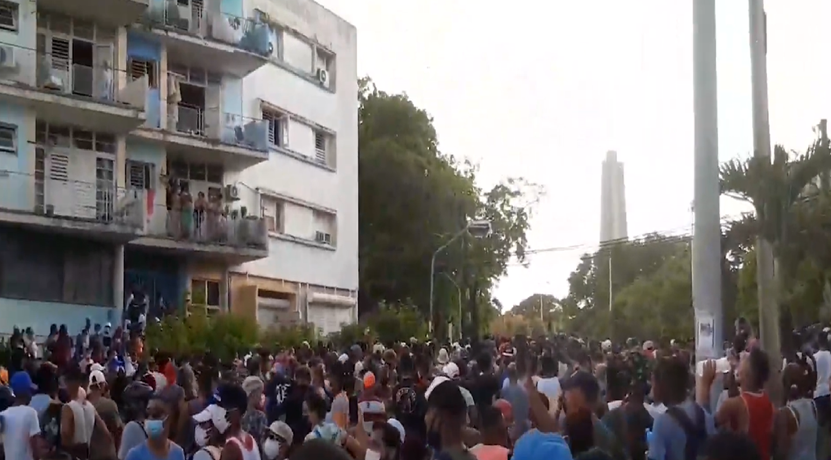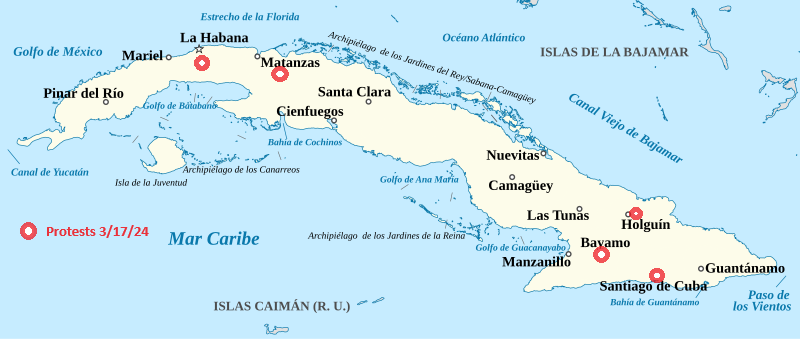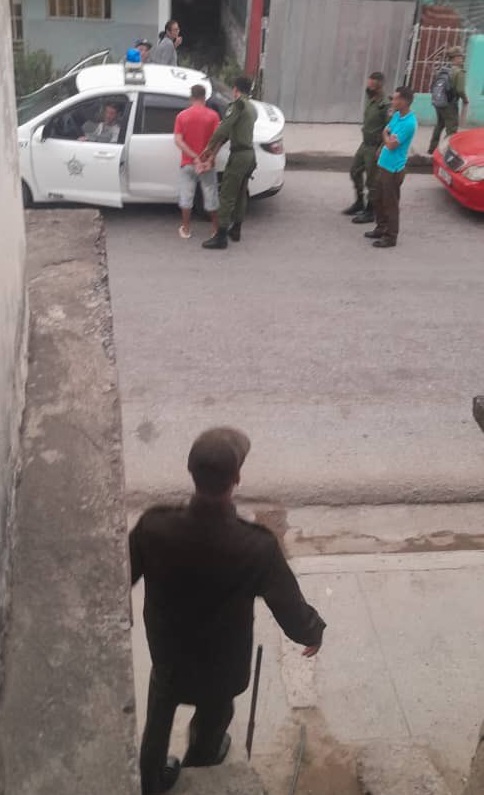To promote a nonviolent transition to a Cuba that respects human rights, political and economic freedoms, and the rule of law.

More mass protests in Cuba, and the latest crackdown
More mass protests in Cuba

Protests in Havana against the government of Cuba [ 14ymedio ]
More mass protests broke out initially in Santiago de Cuba province on March 17, 2024, and despite mass mobilization of repressive forces, the existing new draconian penal code, and a mass exodus of hundreds of thousands of disaffected Cubans, protests spread to four others ( Artemisa, Granma, Holguin, and Matanzas ). Protests were largely shutdown by March 19th, and reports of arbitrary detentions are being documented.
Prisoners Defenders (PD) is reporting 32 arbitrary detentions between March 17th and March 19th connected to protests that broke out first in Santiago de Cuba and spread across the island. According to Javier Larrondo, director of Prisoners Defenders, a Spain based NGO, the province with the most arbitrary detentions identified during the 17M protests is Holguin with 13 detained, followed Santiago de Cuba (7), Havana (4), Cienfuegos (2) and Artemisa (2).

Austerity package imposed in March 2024
On the evening of January 9, 2024 Cuban officials announced that gas prices would be raised 528%, fares for trains and inter-provincial buses would increase in cost by 180% in February 2024, This came on top of Prime Minister Manuel Marrero's December 2023 announcement that the MIPYMES, an acronym for new private businesses, would be subjected to higher taxes, higher import fees, and a 25% increase in the electric bill. Their internal surveillance mechanisms most likely told regime officials that it would lead protests, and the austerity measures were delayed until March 1, 2024. News also emerged at this time of shortages of flour and powdered milk.
CFC’s Janisset Rivero was interviewed by Scripps News Service.
"There is no economic freedom. There is no political freedom. There's nothing in Cuba," said Janisset Rivero with the Center for a Free Cuba, a nonprofit group of Cuban exiles pushing for regime change on the island.
Rivero migrated to Miami in the early 1990s and still has family in Cuba. "When I left the island, I couldn't see them again," she said. "So, I miss my family — the family I left there." What is happening now is dire, Rivero said.
Solidarity
On March 18th while protests continued in Cuba, Cubans and Cuban Americans protested outside the Cuban Embassy to demonstrate their solidarity with their counterparts in the island.
Journalist Jacqueline Quynh reported in a story for WUSA9, on March 21st that explained the reasons for the protests on the island, and in the District.
"Imagine, 30 eggs cost you from 2,000 to 3,000 Cuban pesos, and people's pension for somebody over 65 is 2,500," Roque lamented. While he finds it difficult to discern the true extent of the situation, Roque is adamant that the people in Cuba need assistance.
"They're left to suffer, and if they speak out, they're rounded up and arrested," said John Suarez, Executive Director of the group. The organization is advocating for the release of prisoners they claim were peacefully protesting. "Our message to the American people and the Biden administration is to stop trying to placate the dictatorship and directly aid the Cubans on the island."
Cuban dictatorship’s double discourse
Santiago’s Communist Party boss, Beatriz Johnson, claimied that Cuban protesters weren’t against her, and Raul Castro’s hand picked “President” Miguel Díaz-Canel used Twitter to describe the protests as “various people” having “expressed their dissatisfaction with the situation of electrical service and food distribution.” He pledged, that his government stands ready “to attend to the complaints of our people.” This was for foreign consumption.
Domestically, a different tone, and message was sent regarding nonviolent demonstrators.
Sierra Maestra, the local official newspaper organ of the Communist Party in Santiago de Cuba, published an article that vilified the demonstratorswho took to the streets on March 17th across Cuba. Calling the protests a “degrading spectacle,” the author used all kinds of derogatory epithets to refer to the people who participated in the peaceful demonstrations. Mayté García Tintoré, the author of the officially sanctioned piece, called those who raised their voices against the blackouts, food shortages and mismanagement of the government “lazy”, “disengaged”, and “parasites”.
Freedom of expression punished.

Translation: “Hey Las Tunas what? You put it on 4 you turn it off five and six. Are we going to stay like that?”
Victor Manuel Hidalgo Cabrales posted the above cartoon on his Facebook page criticizing the power outages, and it has led to his ongoing detention in the Provincial Instruction in the province of Las Tunas in Cuba. He was approached by state security at his home within an hour of posting the cartoon, and asked to take it down. He agreed to, but was unable to do so due to a power outage, went to sleep and was woken up by a massive state security operation, and taken away.

Victor Manuel Hidalgo Cabrales taken away by state security for a Facebook post.
The wife of Victor Manuel Hidalgo Cabrales made a video recording describing in detail how her husband was jailed for expressing an opinion in a Facebook post about the prolonged power outages.
What should be done next?
Cuban intellectuals on and off the island are speaking out, but their advice is not being heeded by officials.
The Christian Liberation Movement, a dissident movement based in Cuba, issued a statement on March 20, 2024 in which they call on the international community to take two concrete actions in response to regime repression.
The immediate solidarity of the world with the legitimate right of Cubans to live in freedom and prosperity, expressed in concrete actions and not in political rhetoric without direct consequences in tyranny.
A policy of exclusion and isolation of the Havana communist party regime in response to the continuous repression and segregation by the power group and the military.
The Christian Liberation Movement {MCL in Spanish] warns that continuing to legitimize and engage with the regime and continuing to accept its logic of imposed blackmail and violence, not taking the people of Cuba as a reference and independent voice, will lead to bloodshed, and once that is underway, it will be too late for the international community to act, but this warning by MCL means that they will not be able to say they didn’t know.






No comments:
Post a Comment